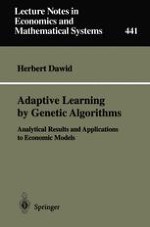1996 | OriginalPaper | Buchkapitel
Bounded Rationality and Artificial Intelligence
verfasst von : Dr. Herbert Dawid
Erschienen in: Adaptive Learning by Genetic Algorithms
Verlag: Springer Berlin Heidelberg
Enthalten in: Professional Book Archive
Aktivieren Sie unsere intelligente Suche, um passende Fachinhalte oder Patente zu finden.
Wählen Sie Textabschnitte aus um mit Künstlicher Intelligenz passenden Patente zu finden. powered by
Markieren Sie Textabschnitte, um KI-gestützt weitere passende Inhalte zu finden. powered by
The traditional and most widely used approach for the analysis of economic systems is concentrated on equilibrium behavior. We may say that an equilibrium in the broadest sense is a situation where no agent has any incentive to deviate unilaterally from the current behavior. There are several equilibrium concepts for different classes of economic models but all these concepts rely on similar assumptions about the rationality of the economic agents. Basically two assumptions have to be made in order to state that an economic system will a priori be in equilibrium. First we have to assume that all agents are willing and able to maximize their expected utility and second that all agents have rational expectations. Rational expectations means that all agents have identical and exactly correct beliefs about how everyone will behave. Agents who fulfil both assumptions are often called completely rational.
